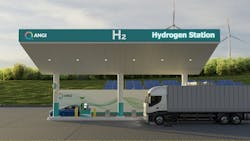ANGI Energy Systems Introduces $4M Hydrogen Refueling Test Facility in the Midwest
ANGI Energy Systems, a Vontier business, has inaugurated its $4 million hydrogen refueling test facility in the Midwest.
The 3,000 sq ft facility is located at ANGI's headquarters in Janesville, Wisconsin. While the facility will be a foundation for R&D activity, it will also enable the testing and validating of hydrogen refueling station systems and components, including functional testing of globally standardized SAE J2601 refueling protocols for gaseous hydrogen.
The new facility will also showcase the viability of hydrogen as a sustainable and secure energy source to reduce the carbon intensity of hard-to-abate sectors such as transportation and industry. According to the US National Clean Hydrogen Strategy and Roadmap, heavy-duty transportation is identified as a high-impact use for clean hydrogen.
Construction on the facility is expected to be completed by July 2024, and in-house acceptance testing and validation activities will begin once it is commissioned. Starting in early 2026, the facility will be available for third-party companies to use for their own projects.
ANGI also plans to form partnerships with local colleges to provide apprenticeship opportunities and build a highly skilled workforce in the Midwest. These future experts will lead the design and development of the hydrogen refueling infrastructure for customers in the US and around the world.
"We can't wait to showcase our best-in-class hydrogen refueling technology as part of our complete Alternative Energies Platform at the Advanced Clean Transportation Expo in Las Vegas in May,” said Joel van Rensburg, President of ANGI.
ANGI is preparing to ship and build its first hydrogen refueling station (HRS) customer order from Trillium Energy to be installed at Santa Clarita Transit in the summer of 2024. Its HRS solution, which is based on a modular design, offers uniquely configurable and flexible systems with high reliability supported by an extensive network of service and maintenance technicians.
A typical HRS consists of a hydrogen dispenser, redundant compression capabilities, a site recirculation system, chillers, and a gas management panel to control the flow and pressure of gas within the station.





